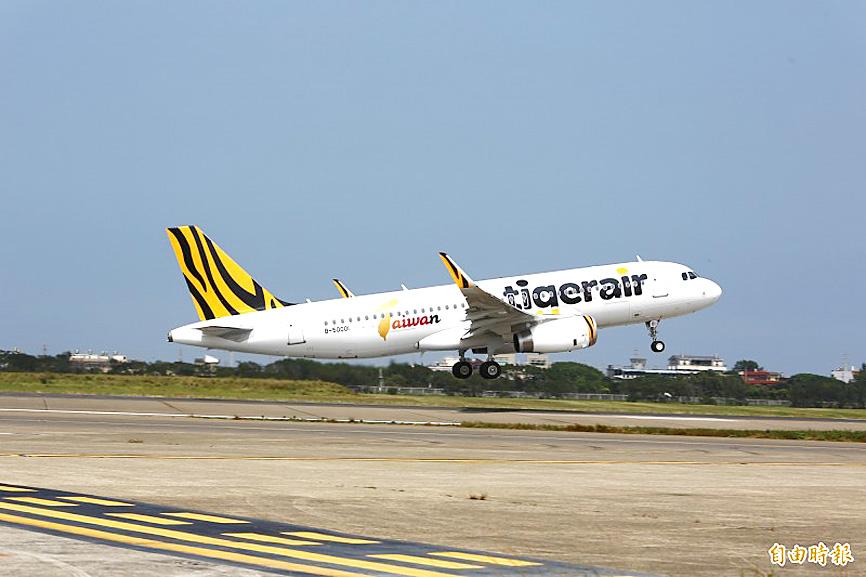Tigerair Taiwan Ltd (台灣虎航) has applied to the Taiwan Stock Exchange (TWSE) to list its shares on the main board, hoping to raise more capital before the international travel market recovers next year, the low-cost carrier said yesterday.
Although the airline falls short of the main board’s stricter requirements, as it reported a loss last year amid the COVID-19 pandemic, it should be eligible under relaxed listing rules for companies affected by the pandemic, the exchange told the Taipei Times by telephone.
Under the relaxed rules, the review committee focuses on an applicant’s financial results from every year except for the one affected by COVID-19, the exchange added.

Photo courtesy of Tigerair Taiwan
Tigerair Taiwan reported net profit of NT$981 million (US$35.43 million) in 2018 and NT$808 million in 2019, before reporting net loss of NT$1.37 billion last year.
“The applicant’s financial performance is just one of many factors to be considered. We will focus on its business growth potential,” TWSE spokeswoman Rebecca Chen (陳麗卿) said.
“We will examine the airline’s business plan to see how it has adapted to the pandemic, whose development is difficult to forecast,” Chen said.
Of the firms that have applied under the relaxed rules, not many have been approved, Chen added.
Tigerair Taiwan expects Japan and South Korea, its two main markets, to have less restrictive border controls and quarantine measures after the Lunar New Year holiday, as their vaccination rates continue to rise, spokesperson Bernard Hsu (許致遠) said by telephone.
“Some countries tightened their border controls recently due to the spread of the Omicron variant [of SARS-CoV-2], but we think that was actually good for the aviation industry, as the strict measures will help contain the pandemic,” Hsu said.
“The earlier the countries contain the pandemic, the sooner they will reopen their borders,” he said.
The airline hopes to attract more capital to improve its operation and information system before the international travel market recovers, Hsu said.
The airline issued 120 million new shares in September, raising NT$3 billion, and most of its new shares were bought by its parent company, China Airlines Ltd (CAL, 中華航空), and its affiliate, Mandarin Airlines (華信航空), company data showed.
Tigerair Taiwan would issue new shares if it is approved to be listed on the main board, as CAL and Mandarin hold a combined stake of 81.3 percent in the airline, higher than the limit of 70 percent, Hsu said.
The company used the proceeds raised this year to improve its digital system to do big data analysis, and plans to launch new membership programs and travel programs next year, he said.
It received two Airbus 320neo jets this year and would take delivery of the other two planes next year, reducing the average age of fleet to five year old, a comparatively low number, he added.

In Italy’s storied gold-making hubs, jewelers are reworking their designs to trim gold content as they race to blunt the effect of record prices and appeal to shoppers watching their budgets. Gold prices hit a record high on Thursday, surging near US$5,600 an ounce, more than double a year ago as geopolitical concerns and jitters over trade pushed investors toward the safe-haven asset. The rally is putting undue pressure on small artisans as they face mounting demands from customers, including international brands, to produce cheaper items, from signature pieces to wedding rings, according to interviews with four independent jewelers in Italy’s main

Macronix International Co (旺宏), the world’s biggest NOR flash memory supplier, yesterday said it would spend NT$22 billion (US$699.1 million) on capacity expansion this year to increase its production of mid-to-low-density memory chips as the world’s major memorychip suppliers are phasing out the market. The company said its planned capital expenditures are about 11 times higher than the NT$1.8 billion it spent on new facilities and equipment last year. A majority of this year’s outlay would be allocated to step up capacity of multi-level cell (MLC) NAND flash memory chips, which are used in embedded multimedia cards (eMMC), a managed

Japanese Prime Minister Sanae Takaichi has talked up the benefits of a weaker yen in a campaign speech, adopting a tone at odds with her finance ministry, which has refused to rule out any options to counter excessive foreign exchange volatility. Takaichi later softened her stance, saying she did not have a preference for the yen’s direction. “People say the weak yen is bad right now, but for export industries, it’s a major opportunity,” Takaichi said on Saturday at a rally for Liberal Democratic Party candidate Daishiro Yamagiwa in Kanagawa Prefecture ahead of a snap election on Sunday. “Whether it’s selling food or

In the wake of strong global demand for AI applications, Taiwan’s export-oriented economy accelerated with the composite index of economic indicators flashing the first “red” light in December for one year, indicating the economy is in booming mode, the National Development Council (NDC) said yesterday. Moreover, the index of leading indicators, which gauges the potential state of the economy over the next six months, also moved higher in December amid growing optimism over the outlook, the NDC said. In December, the index of economic indicators rose one point from a month earlier to 38, at the lower end of the “red” light.